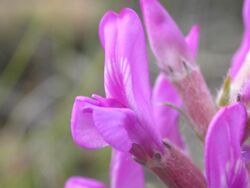Biology:Oxytropis lambertii
| Oxytropis lambertii | |
|---|---|

| |
| Scientific classification | |
| Kingdom: | Plantae |
| Clade: | Tracheophytes |
| Clade: | Angiosperms |
| Clade: | Eudicots |
| Clade: | Rosids |
| Order: | Fabales |
| Family: | Fabaceae |
| Subfamily: | Faboideae |
| Genus: | Oxytropis |
| Species: | O. lambertii
|
| Binomial name | |
| Oxytropis lambertii | |
Oxytropis lambertii commonly known as purple locoweed,[1] Colorado locoweed,[2] Lambert's crazy weed,[3] or Lambert’s Locoweed[4] is a species of flowering plant in the legume family.
Distribution
It is native to grasslands in the Canadian Prairie of central Canada and in the mid-west and Great Plains of the United States from Texas to Manitoba and west to Arizona and Montana.[5][1]
Description
Oxytropis lambertii is a perennial herb producing a patch of basal leaves around the root crown, and several showy erect inflorescences. The leaf is compound with several silvery-green leaflets. The inflorescence produces several flowers, each borne in a tubular purple or pinkish calyx of sepals covered thinly in silver hairs. The pealike flower corolla is reddish or bluish purple with a lighter patch at the base of the banner. The fruit is a cylindrical legume pod.
Toxic
The Oxytropis lambertii plant is one of the locoweeds most frequently implicated in livestock poisoning.[6] The toxin is called swainsonine. Research suggests that the plant itself may not be toxic, but becomes toxic when inhabited by endophytic fungi of the genus Embellisia, which produce swainsonine.[7]
See also
References
- ↑ 1.0 1.1 USDA, NRCS. (2023). "Oxytropis lambertii Pursh". Greensboro, NC USA.: National Plant Data Team. https://plants.usda.gov/home/plantProfile?symbol=OXLA3.
- ↑ Crossley, John. "Oxytropis Lambertii, Purple Locoweed". https://www.americansouthwest.net/plants/wildflowers/oxytropis-lambertii.html.
- ↑ "Purple locoweed, Lambert's crazy weed". Colorado State University. https://csuvth.colostate.edu/poisonous_plants/Plants/Details/102.
- ↑ Fox, III, William E.; Allred, Kelly W.; Roalson, Eric H.. "A Guide to the Common Locoweeds and Milkvetches of New Mexico". New Mexico State University. https://pubs.nmsu.edu/_circulars/CR557/.
- ↑ USGS. Native Wildflowers of the North Dakota Grasslands
- ↑ Ralphs, M. H., et al. (2002). Distribution of locoweed toxin swainsonine in populations of Oxytropis lambertii. J Chem Ecol 28:4 701-7.
- ↑ McLain-Romero, J., et al. (2004). The toxicosis of Embellisia fungi from locoweed (Oxytropis lambertii) is similar to locoweed toxicosis in rats. J Anim Sci 82 2169-74.
External links
Wikidata ☰ Q7116189 entry
 |

